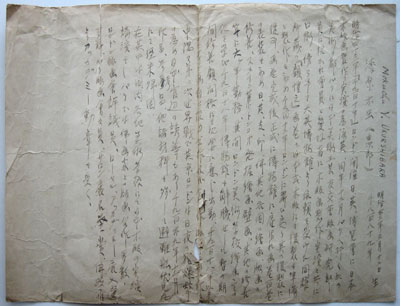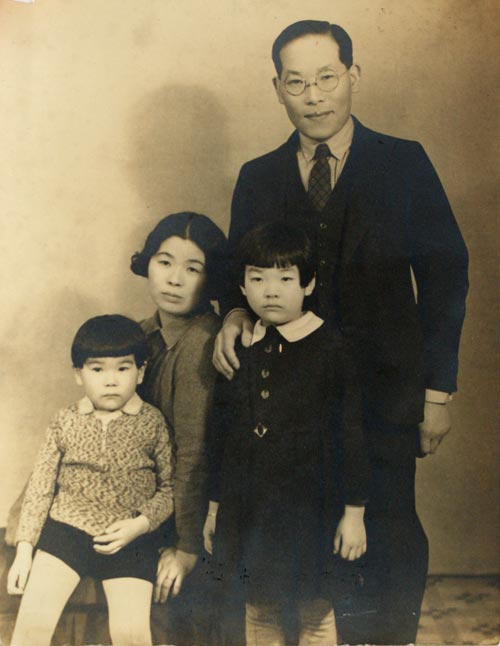|
|
| |
|
|
|
|
|
|
|
 |
|
| ||
|
|
| |
|
|
| |
|
|
|
|
|
|
Chronology of Urushibara's Life |
|
1889 |
|
Yoshijiro Urushibara born 12 March, 1889, at Shiba, Tokio, the fourth son of Kanryo Urushibara and his wife Tsuru. (This date has been confirmed by the official family register.) Of his three elder brothers, Eijiro Urushibara and Sanjiro Urushibara were also printers of woodcut prints. |
|
late 1900s |
|
Takes employment with Shinbi Shoin, a company specializing in woodblock reproductions. |
|
1910 |
|
Went to London, England as a member of a Japanese group of woodcut print block carvers and printers to demonstrate Japanese woodcut print production at the Anglo-Japanese Exhibition held that year (May~October), organised by Count Hirokichi Mutsu. |
|
1910 |
|
In December, went to Paris at the invitation of ???? to conduct demonstrations and give talks on the production of Japanese woodcut prints. |
|
1912 |
|
Returned to London and was hired by the British Museum to handle the mounting and restoration of old prints/pictures. This work included handling the pictures brought to England from the Tonko excavations in China by Sir Marc Aurel Stein. Also participated in the reproduction of the scroll of pictures by the 4th century Chinese artist, Gu Kaizhi entitled 'Admonitions to the Court Ladies' [sample image] |
|
1915 |
|
Registered under the National Registration Act, 1915. Occupation listed as 'print restorer'. It is not known whether he was ever called up under the act (Japan and Britain were Allies during WWI). |
|
1917~ |
|
From around 1917 to 1923, he reproduced some 50 pictures rendered by Frank Brangwyn, R. A. In this period - it is not known exactly when - he began to use the 'art name' Mokuchu [木虫] |
|
1918 |
|
Left the employ of the British Museum but continued to serve as print restorer/adviser. |
|
1918~1939 |
|
From shortly after the end of the Great War until shortly before the outbreak of World War II, made regular trips to France to collaborate with French artists. |
|
1919 |
|
Print folio 'Bruges', with designs by Frank Brangwyn, illustrating six poems by Lawrence Binyon, is published. |
|
1921 |
|
Honorable Mention, Societe des Artistes Francais, Salon de 1921. [ Certificate (enlargement) | Medal (obverse | reverse) ] |
|
1924 |
|
Print folio 'Ten Woodcuts - Cut and Printed in Colour by Yoshijiro Urushibara - after designs by Frank Brangwyn, RA' is published. |
|
1927 |
|
Appointed Officier d'Academie by French Le Ministre de l'Instruction Publique on 1st April. [ Certificate (enlargement) | Medal (closeup) ] |
|
1928 |
|
Married Takae (nee Kojima). |
|
1929 |
|
Daughter Hideko born on 22 August, 1929 (Hideko deceased 12 October, 2002) |
|
1930 |
|
Son Ichiro born on 20 October, 1930. |
|
1940 |
|
Print folio 'Leaves from the Sketch Books of Frank Brangwyn cut by Urushibara' is published by F. Lewis, of Leigh-on-Sea. Urushibara sent a copy of the print folio to the then Prime Minister, Mr. Winston Churchill (this of course was before Mr. Churchill was knighted) around July or August of that year, and despite the fact that this period was what was called the "Battle of Britain" when Britain was being subjected to severe bombing by Nazi Germany on a daily basis, Mr. Churchill took the time to send a personal letter of thanks. Urushibara's son Ichiro still treasures the original letter as a family heirloom. [view the letter] |
|
1940 |
|
Left London with family at the end of October, 1940, under advisement from the Japanese Embassy in Tokyo in light of the possibility that Japan would become embroiled in World War II in collaboration with Germany and Italy. Travelled from London to Liverpool by rail, crossed the Irish channel to Dublin, transited Ireland to Galway by rail, and there boarded NYK liner, SS Fushimi Maru 1 bound for Japan. Travelling via Bermuda, New York, Newport News, Panama Canal, San Pedro (Los Angeles), arrived in Yokohama on 8 January, 1941. (Due to the difficulty and expense of transport, a number of prints, personal documents, tools and woodblocks are left in storage with friends.) |
|
1941~ |
|
Resumed his work, and held exhibitions at the Mitsukoshi Department stores in Tokyo and Kobe. |
|
1945 |
|
With the possibility of an invasion of Japan by Allied powers looming, at age 56, assumed a clerical position in a chemical company designated as an essential industry, to avoid being conscripted. Resigned virtually immediately with the end of the World War II, and resumed work as woodcut producer. |
|
1953 |
|
Passed away on 6 January, 1953 of lung cancer. |
|
198? |
|
The artist's son - Ichiro Urushibara - travels to Europe from Japan, and manages to make contact with one of the people storing the material left behind in 1940, arranging for it to be shipped to Tokyo. It is this 'collection' that has provided much of the material for this website, including the print photographs. |
|
|
|
Footnotes (1) A footnote in the reference work 'The New Wave' (page 54) mentions that this return to Japan was made in 1942 on the Swedish ship 'Gripsholm'. Ichiro Urushibara states that this is in error, and that the information in the chronology above is the correct account of his family travels at that time. |
|
|
|
